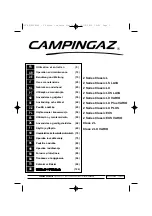
ENG
LISH
3
gloves, long-handled tongs, or cooking mitts at all times, since the grill will become
very hot. Open the hood carefully when cooking to avoid burns from the hot air and
steam trapped inside.
6. Never use the grill without the grease tray installed and hung under the firebox. Without
the grease tray, hot grease and debris could leak downward and produce a fire hazard.
7. Do not obstruct the flow of combustion and ventilation air to this appliance. Keep
the burner tube and portholes clean and free from debris. Clean before use. Regular
care and maintenance is required to prolong the lifespan of your unit.
8. Always check for gas leaks when you connect and disconnect the regulator to the
gas cylinder, especially after a period of storage (for example, over winter). Check
all connections for leaks with a soapy water solution and brush. Never use an open
flame to check for leaks.
9. Clean and inspect the gas regulator before each use of the outdoor cooking gas
appliance. Replace the gas regulator prior to being used if there is evidence of
excessive abrasion or wear. Use only the gas regulator assembly that has been
supplied with this gas grill. Do not use a regulator from another manufacturer.
Do not use lava rock, wood chunks, charcoal, lighter-fluid, or spirit
for lighting your grill. Keep all such substances and liquids well away
from appliance when in use.
10. Operate this appliance using liquefied petroleum only, which is also specified on the
rating label on the unit. Do not attempt to operate your grill on other gases. Do not
attempt to convert this LP unit to natural gas. Failure to follow this warning could
lead to fire, bodily harm, and will void your warranty.
PROPANE GAS WARNINGS
1. Ensure the gas cylinder is purchased by a reputable supplier. An incorrectly filled or
an overfilled LP tank can be dangerous. The overfilled condition combined with the
warming of the LP gas tank (a hot summer day, tank left in the sun, etc.) can cause LP
gas to be released since the temperature increase causes gas to expand. Gas released
from the cylinder is flammable and can be explosive.
2. Do not use an LP gas cylinder if it has a damaged valve or shows signs of dents,
gouges, bulges, fire damage, corrosion, leakage, excessive rust, or other forms of
visual external damage; it may be hazardous and should be checked immediately by
a liquid propane supplier.
If you see, smell, or hear the hiss of gas escaping from the cylinder,
do not attempt to light appliance. Extinguish any open flame.
Disconnect from fuel supply.
3. Do not connect or disconnect the gas cylinder while the unit is in use or is still hot.
When grill is not in use, ensure regulator knob is turned to OFF and disconnect the




































